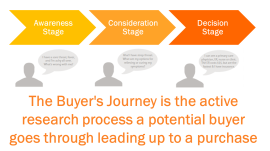The Buyer’s Journey and Keyword Research- What Does it Mean for Your SEO Campaigns?

Whenever a potential customer decides to purchase a product or service, there are 3 stages said customer goes through: Awareness, Consideration and Decision. During the Awareness stage, the customer becomes aware of the fact that they have a need, and begins researching how to take care of that need. Then, in the Consideration phase, the customer will more carefully consider the providers they’ve narrowed their choice down to during the Awareness phase. In the Decision phase, the customer reaches a decision and chooses a vendor to satisfy their needs. In each of these phases the keywords potential customers use to search Google are different.

It’d be great if we could only get people in the Decision phase, who’ve already done their research and narrowed their options- but that’s letting a lot of potential business fall by the wayside as well. Search Engine Optimization strategies should be aligned with consideration of all 3 stages of the Journey in mind, since everything in SEO hinges on the keyword research.
Awareness Stage
Consider long-tail keywords; at this point you are going after clients by trying to secure top listings for informational, research-oriented keywords. Your target audience here is mainly people who have just become aware of a need for your product or service, and people who have very specific, niche queries. Some phrases to consider optimizing for at this point would be:
[table type=”table-striped”]
| [product name] information | [product name] questions |
| [product name] FAQ | [product name] company |
| Brand Name + Main Keyword | [service name] provider |
[/table]
Consideration Stage
The Consideration stage is more of a comparison process, a winnowing-down of potential providers. Potential customers will compare products, ask for demos, and start thinking about how to secure buy-in from the people writing the checks. At this phase, you want to start thinking about how to shift your message from “attract” to “justify”; consider keyword phrases like:
[table type=”table-striped”]
| compare [service name] companies | [brand name] reviews |
|---|---|
| [brand name] vs. [competitor] | [service name] solution |
| [customer need] ROI | [service name] demo |
| [product name] pricing | [product name] sales |
[/table]
Decision Stage
At the Decision stage, you’re dealing with someone who has the financial support of the C suite and is ready to pick a vendor and buy. Details are usually how the Decision stage is won- buyers will be looking for vendors that provide support, value and assist with implementation. They will also read “stories” about the brand in the form of testimonials and case studies to help them make their final determination.
[table type=”table-striped”]
| [product name] implementation | [product name] testimonial |
| [product name] customer service | [service name] best practices |
| [product name] case study | [buy] service name |
[/table]
Remember, one of the biggest goals of SEO is to attract interest from potential customers that probably don’t know about you yet. By aligning your keywords with the specific search intent at the various stages of the Buyer’s Journey, you’ll be sure to speaking their language, building trust, and working toward a conversion.
